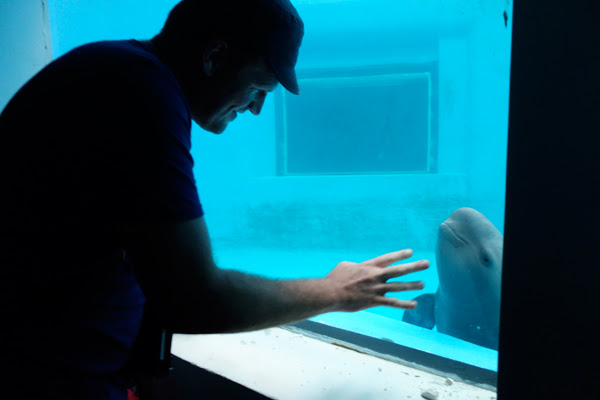Running dry: water crisis worsens in Jordan as refugees flood in (commentary)
Commentary by Leo Kendrick We have all become familiar with headlines detailing the latest massacre of civilians by ISIS, or the struggles of refugees exiting Syria. It is indeed rare that we hear good news coming from the region. When we do, it is often related to the Hashemite Kingdom of Jordan, a small country in the heart of the region that has become a welcoming haven for refugees displaced by the war in Syria and other...
Thank You, Madagascar: Conservation Diaries of Alison Jolly – book review
By Gabriel Thoumi In Thank You, Madagascar: Conservation Diaries of Alison Jolly, Dr. Jolly tells the riveting, personal, and often heroic tale of Madagascar conservation. For over fifty years, from her first steps in Madagascar in the early 1960s to her most recent visit before her untimely passing February 2014, she takes the reader step-by-step through Madagascar’s conservations successes and challenges as the countries careens...
The Bee: A Natural History – book review
By Gabriel Thoumi Did you know… There are 20,000 species of bees on Earth. Bees pollinate 130 of the foods we depend on and are often the sole and only pollinator of the foods we eat every day. Bees and other animals cross-pollinate over 90 percent of Earth’s plants. Bees co-evolved, along with angiosperms – flowering plants – over 100 million years ago. Ancient Egyptians were avid beekeepers possibly as far back as 5,000 BCE – or...
Reporter’s Journal: A story sans words
Special Reporting Initiatives photographer Dominic Bracco II tries to capture the aquaculture scene at Liangzi Lake. A local fishfarmer attempts to capture his own view. Dominic’s photos will appear with Erik Vance’s reporting on the demand for sustainable fisheries products in China.
Reporter’s Journal: It isn’t a beluga
Special Reporting Initiatives Fellow Erik Vance gets up close and personal with a finless porpoise housed at Institute of Hydrobiology in Wuhan, China. Vance and his colleague, photographer Dominic Bracco II, are reporting on the market for sustainable fisheries in China. Photo credit: Shouqi...
Reporter’s Journal: Bomb Harvest
Porters sort and tally a week’s worth of landings from a bomb fishing crew before carrying the catch to the docks in Makassar, Indonesia. Each plastic basket is worth Rp. 100,000 ($8). The full tally for this boat was Rp. 18,800,000 or $1404. The porters get paid a percentage for shuttling the catch to shore and selling the fish to wholesale distributors in the city. This photo was taken by Mongabay.org’s Special Reporting...
Reporter’s Journal: A Wood & Glass View
Wood and glass goggles used by traditional divers throughout Sulawesi. Though produced near-exclusively by the Bajau sea gypsies, “traditional” goggles are commonly used, regardless of ethnic group, when spear-fishing, cyanide fishing or collecting sea cucumbers, groupers or fish killed with bombs that are detonated underwater. However rubber recreational dive masks are becoming more prevalent. This photo was taken by Mongabay.org’s...
Reporter’s Journal: In Search of Sardines
Community members crowd aboard a slerek purse-seiner in Muncar, East Java, the morning after a successful sardine fishing expedition. University of British Columbia researchers calculated that nearly half the landings in Muncar are distributed to the crew, their relatives, and their neighbors, to eat at home or sell. Though an insurance for protein-rich diets among the local community, the practice means that commercial sardine sales...
Reporter’s Journal: Infant Shrimp
A technician checks on week-old shrimp larvae or nauplius, at the world’s largest shrimp and mollusk broodstock center in Bugbug, Indonesia. The center hopes to become a major supplier inexpensive and healthy “parent” shrimp to Indonesia’s domestic shrimp farming industry, to reduce reliance on pricier and occasionally disease-ridden imports from abroad. Indonesia is one of a handful of shrimp-producing countries unaffected by...
Reporter’s Journal: Fishermans’ Wives
Fishermens’ wives negotiate a price for freshly caught sardines in Negara, a town on the shores of the Bali Strait. The strait is about to become Indonesia’s first region to be managed under an ecosystem-based approach to fisheries management. This photo was taken by Mongabay.org’s Special Reporting Initiatives fellow Melati Kaye, who is reporting on the state of the fishing industry in...
Reporter’s Journal: from the fish warehouse
A worker packs Leopard Coral Grouper in a warehouse in Makassar, Indonesia. Indonesia is one of the world’s largest suppliers of live reef fish, mostly to East Asian markets. Though selling live reef fish is legal in Indonesia, many of the fish are caught illegally using cyanide. This photo was taken by Mongabay.org’s Special Reporting Initiatives fellow Melati Kaye, who is reporting on the state of the fishing industry in...
BBC World Service: Climate Change and Community Forest Management in Kuna Yala, Panama
Mongabay SRI Fellow Ruxandra Guidi published a seven-minute segment on BBC World Service’s Science in Action program. The piece focuses on the indigenous Kuna of Panama, whose livelihoods and homes are already being affected by sea level rise and climate change, and the ways in which they are adapting to it while trying to preserve their customs and sovereign control of their forests. Listen to the full segment...
Reporter’s Journal: Disappearing Home
By Melati Kaye A boy takes in the sunset on Barang Lompo, one of the Spermonde Islands in Indonesia. The loss of local reef cover from destructive fishing practices and soil runoff from the nearby city of Makassar exposes islands like Barang Lampo to extreme weather. Over the last thirty years, this tiny island, like others in the region, has lost a tenth of its landmass from the erosive force of storm surges and increasingly larger...
Reporter’s Journal: From Panama
By SRI Fellow Ruxandra Guidi Don Jesus was tasked with the logistics for the conference, and Don Feliciano would be taking care of all the meals for more than 25 people. This was no small feat for these two septuagenarian men, who had to do a lot of phone calling and running around in order to try to secure things like ice and a motorboat and a generator. In the end, ice was the only thing they couldn’t get — and that’s because...
Reporter’s Journal: Fighting poachers and Mother Nature
Fijians communities are largely in charge of managing their waterfront. Volunteer fish wardens in the village, appointed by the chief or the Minister, are the only official members of a village who can legally stop poachers. Though they rarely have any equipment to enforce protection of their tabus (swaths of temporarily protected marine areas inside their fishing grounds), they are harder pressed to fight the effects of climate...
Reporter’s Journal: The Lesser Fish
In Fiji’s capital city of Suva, middlemen buy directly from the fishers. The majority of the fish arrive early Saturday morning, indicating many of the reef fish are caught at night while many fish are asleep, making them easy targets for spearfishers. In the past, larger quantities of fresh fish was available daily. Now the sellers make fewer catches stretch across the week. The overwhelming concern about the region’s...
Reporter’s Journal: Dock Boys
By Melati Kaye “Dock boys” take a swim break from sorting and carrying fish at Makassar’s Paotere harbor, where fish caught with hook and line, homemade bombs, and cyanide are brought to port and sold. This photo was taken by SRI fellow Melati Kaye, who is reporting on the State of Indonesian Fisheries.
Reporter’s Journal: The forests of Uganda
In late January through early February I traveled to Uganda as part of the first Mongabay Special Reporting Initiative (SRI) to report on “the next big thing in tropical forest biodiversity conservation.” I’m a world traveler, and I have a special passion for tropical rainforests — having seen them in Australia, the Peruvian Amazon, Asia, and Central America. Africa was my last continent to visit (OK, does...
Reporter’s Journal: a different kind of leopard
By Melati Kaye March is leopard coral grouper season in South Sulawesi’s Spermonde islands. The live fish sell for $30 per kilogram. Dead fish fetch less than a third of that price. Careful hook and line fishermen can sometimes manage to keep their catch alive. But a surer method is to stun the fish with cyanide, an illegal but widespread practice. This photo was taken by Mongabay.org’s Special Reporting Initiatives fellow...




















